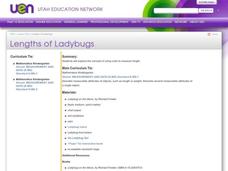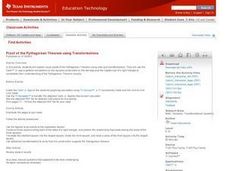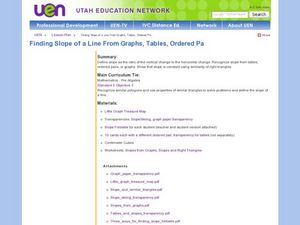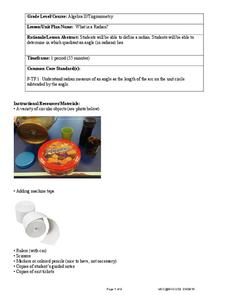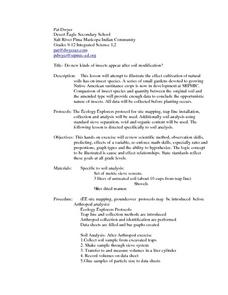Curated OER
Make a Model of a Wright Flyer
Students recreate a model of the 1903 Wright Flyer out of Styrofoam. Students practice following instructions, and discover information about the Wright brothers' engine-powered glider.
Curated OER
If You Can’t Stand the Heat
Young scholars design and build their own solar cooker. In this math lesson, students determine the relationship between the angles of the sun, reflection and cooking time of the solar cooker. They test their project, collect data...
Curated OER
Cartography
Students follow directions to draw a map of an island. They complete the island map adding their own details using symbols and a legend.
Curated OER
Robots
Second graders examine the concepts of direction and movement as they attempt to program a robot to move. They design a set of instructions using right, left, forward, backwards, and quarter turn so that the robot can accomplish tasks.
Curated OER
Are You Coordinated?
First graders are introduced to a coordinate graph. They are given a graph and follow directions to place stickers in the designated blocks. They write coordinate points to identify the placement of their stickers.
Curated OER
Lengths of Ladybugs
Students are read a book about ladybugs. Using the test, they estimate which page shows the longest trip the ladybug made. They assemble their own ladybug book by following directions on a worksheet. They take measurements on each...
Curated OER
Tangrams
Students construct the tangram pieces from a square paper by following directions to fold and cut. They make observations on the pieces formed and compare how they are related to each other. Students explore patterns and shapes with...
Curated OER
Let's Find the Missing Piece
In this missing piece activity, learners follow directions, determining which piece shown was the piece cut out of a picture shown above the "missing piece" choices.
Curated OER
Using a Hundreds Chart
Youngsters participate in three activities using the hundreds chart. They will choose numbers to add up to one hundred. Whoever gets the most combinations wins. Two variations of the game are supplied.
Curated OER
Scatter-Brained
Seventh graders graph ordered pairs on a coordinate plane. They create a scatterplot. Additionally, they determine the line of best fit and investigate the slope of the line. Multiple resources are provided. An excellent resource!
EngageNY
The Power of Exponential Growth
How do you make a penny grow to $5,000 in just 15 days? Use the examples in this lesson to explore the concept of exponential growth and its comparison to linear models. Pupils come to understand that exponential growth eventually...
Curated OER
Estimating the Mean State Area
Seventh grade statisticians randomly select five states and then determine the mean area. The class then works together to create a dot plot of their results.
Curated OER
Proof of the Pythagorean Theorem Using Transformations
Middle and high schoolers construct a triangle using Cabri Jr. They construct squares on each of the legs and hypotenuse of the triangle. Pupils show that the area of the squares on the leg equal the area of the square on the hypotenuse.
Utah Education Network (UEN)
Finding Slope of a Line from Graphs, Tables, and Ordered Pairs
Middle schoolers explore the concept of slope in numerous ways and start to look at simple linear equations. They describe the slope in a variety of ways such as the steepness of a line, developing a ratio, using graphs, using similar...
Curated OER
Dilations in the Plane
Tenth graders investigate dilations and explore the dilation transformation before investigating the properties of a dilation using Cabri Jr. High schoolers extend the concept of dilatation to the coordinate plane.
Federal Reserve Bank
Cash the Check and Track the Dough
From checking and savings accounts to learning the importance of maintaining records and balancing a bank account, prepare your students to become financially independent and savvy adults, and explore all the intricacies of owning a bank...
West Contra Costa Unified School District
What Is a Radian?
Here's an algebra II activity that strives to make the concept of a radian less abstract and more conceptual. It takes a hands-on approach to exploring the idea of a radian and allows individuals to develop a definition of a...
West Contra Costa Unified School District
Discovering Zero and Negative Exponents
Need a hand with an Algebra II integer exponent lesson plan? This versatile worksheet can be utilized as a lesson plan to supplement instruction. It derives the idea of a negative exponent before practicing a variety of...
Education World
The African American Population in US History
How has the African American population changed over the years? Learners use charts, statistical data, and maps to see how populations in African American communities have changed since the 1860s. Activity modifications are included to...
Teach Engineering
Organic Solar Energy and Berries
You can eat a solar cell? A unit on solar energy begins with a discussion about organic solar cells, followed by directions on how to build your own. After following the teacher's directions to build an anthocyanin...
EngageNY
Interpreting the Standard Deviation
Does standard deviation work for non-symmetrical distributions, and what does it mean? Through the use of examples, high schoolers determine the standard deviation of a variety of distributions and interpret its...
Curated OER
Shapes Game
Show your youngsters how to discern between shapes of different sizes, types, and colors. After the initial introduction, learners choose the type, color, and size of the shape instructed during a game with the whole class.
Curated OER
Frisbee Baseball
Students keep track of the number of tosses it takes them to reach each base, and encourage team members and recognize their successes. To make this activity fit the level of older classes, measure distances and figure averages as you play!
Curated OER
Do new kinds of insects appear after soil modification?
Students explore and experiment with the concept do new kinds of insects appear after soil modification. They assess and review scientific methods of observation, predicting, variables, math skills, ratio, proportions, graphs and the art...





